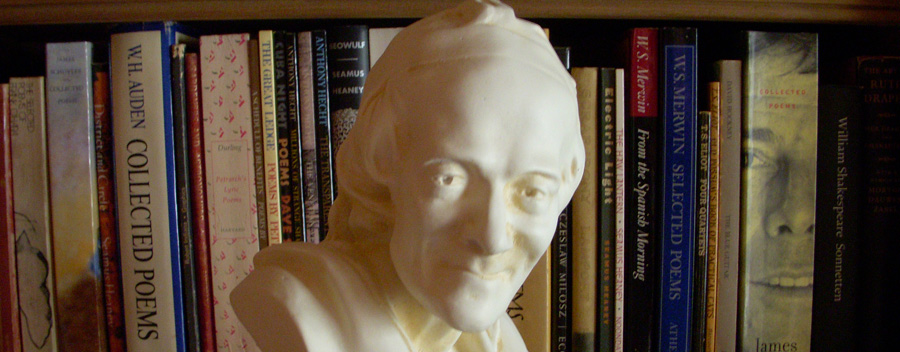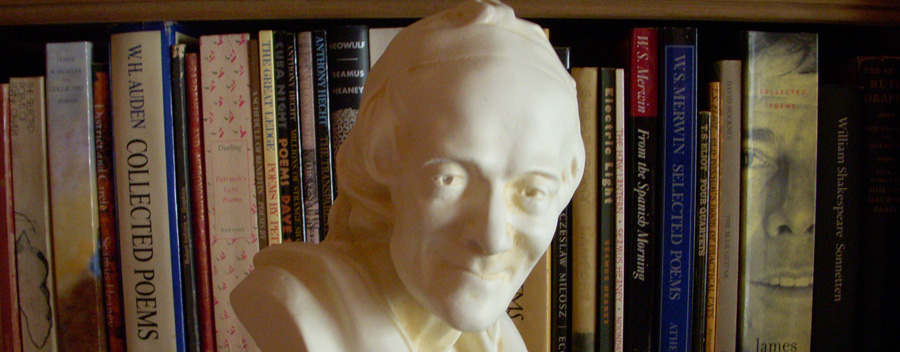Gotham Diary:
Pile-Up
Sunday, August 22nd, 2010
Monday was the only entirely free day last week. On Tuesday, I paid an overdue visit to the podiatrist, and an even more overdue visit to Bloomingdale’s, where I replaced the tattered wallet that I replaced years ago but put back into circulation after my pocket was picked one overlubricated evening circa 2005. Then I went to Lady D’s for lunch. I tried very hard to leave before four o’clock, and managed to depart at half-past three. Lady D always claims to enjoy listening to me talk, a compliment that, while perfectly sincere, makes me feel slightly bilious — perhaps because I know that I could talk until six. The weather was so beastly hot that I did not stop in either at the storage unit or at Agata & Valentina, both on the way home, but took a taxi straight to the front door.
On Wednesday, something snapped in the tank of the commode in Kathleen’s bathroom. I called for the handyman, and proceeded to fret for him to arrive in time for my lunch and Wednesday errands. Most distracting! He came soon enough, but of course he realized right away that he would have to turn around and “get a part.” While he went out for the part, I got back to work in the blue room. When the handyman returned, he cried out. I still don’t know just what he had done or forgotten to do, but the bathroom was flooded, as was the corridor leading to our bedroom, and water was pouring over onto the foyer floor. About an hour later, all was more or less in order — although the carpet, of course, still stinks to high heaven. I mopped up a lot of the water while waiting for the handyman to come back a second time, with another handyman and a heavy-duty vacuum cleaner that sucked up the remaining water. I did get down to the Hi-Life for a club sandwich, and then I got a haircut, as I do now every other Wednesday. Then I ran a few errands on Madison Avenue.
On Thursday, of course, Will was here, bright and early. Kathleen was still asleep when he arrived, and I carried him to her bedside to wake her up. Will, who had a fit once when I assumed my faux sportscaster’s voice (something that anybody who has worked in radio can produce), smiled weakly at Kathleen for a moment and then burst into tears. Perhaps if Megan had been holding him at the time? I’m not sure: Will seems to have definite ideas about our appearance. He and his mother did not stay to dinner, because they were having a sort of party after work at Megan’s office, and she wanted to show off her boy. Had been truly conscientious, Knowing that I’d probably be out for most of Friday, I spent the evening composing the next day’s Daily Office.
Another doctor’s appointment kicked Friday off. It didn’t take long and I had plenty of time to make the first show of The Switch, which got a terrible review in the morning’s Times. I loved it. I can see why Steven Holden didn’t, but I took the movie on entirely different terms. Afterward, I had lunch with Quatorze, and then Ms NOLA came up for a cup of Summer Hours tea — after which we went to the Museum to see how the bambú was coming along. Then we walked over to Agata and bought the fixings for dinner, which Ms NOLA was graciously helped me to prepare. We settled on a risotto with shrimp, fennel, and cherry tomatoes. It was extremely yummy. There were only three of us at dinner — Kathleen came home at “a reasonable hour” — but there was enough risotto for six. Ms NOLA assured us that she would take the leftovers home and enjoy them for breakfast. Yes!
One of my newer routines is to tidy up the bedroom on Friday afternoons, so that it’s done in the event that Kathleen wants to sleep in on Saturday morning. Obviously, I never got to any of that on Friday, but there was no risk of Kathleen’s sleeping in, because we expected a business friend of Kathleen’s from Kuala Lumpur for tea at three. When our friend took off for Newark and the long flight home, I hunkered down in the kitchen and cleaned out the refrigerator. This has become an activity that reminds me of weeding the garden — when I had a garden. Then I did the same with the pantry.
None of foregoing activities is at all interesting to read about, I know, but they make a pile-up that explains, to me at least, why I didn’t get more done here last week. I’m trying to establish reasonable expectations, but budgeting one’s time is never fun. I long for the buffer of an extra day — a sixth weekday, say — but I know that it would very soon cease to be buffer, and the persistence of such foolish hopes has begun to annoy me. There won’t be any extra days any more than there will be extra millions or extra lifetimes. This. Is. It. What’s sad about it is that I went through nearly sixty years without any such sense of urgency.
Come to think of it, Monday wasn’t entirely free, either. Jason Mei came to install a backup drive — two backup drives, “mirrors” — for my ever-growing iTunes files. There was something going on every day of the week! And in the middle of August, too! Oy!
















